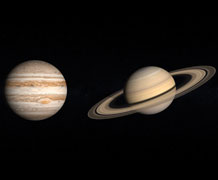
Dr Kong has developed the world’s first, fully three-dimensional model showing the gravitational field of rapidly rotating gaseous planets. Image courtesy of Shutterstock
Exeter scientist secures prestigious award
A University of Exeter scientist has been honoured by the Royal Astronomical Society (RAS) for his ground-breaking research into the internal structure of giant planets within our own Solar System.
Dr Dali Kong has been awarded the Winton Capital Prize for Geophysics for his world-leading research on the structure of Jupiter and Saturn.
His research has played a pivotal role in developing the understanding of the gravitational field and interior structure of the giant planets, which will form an important scientific role in NASA’s Juno and Cassini missions over the next two years.
Dr Kong’s award was one of several announced at the Ordinary Meeting of the society on Friday, 8 January. The winners will be invited to collect their awards at the Society's 2016 National Astronomy Meeting in June.
Dr Kong, an Associate Research Fellow at Exeter’s Mathematics department said: “This is a great honour, and I am extremely proud to have been selected for this award. Exeter has an incredible group of researchers involved in this exciting field and it is incredible exciting to be a part of it. This award recognises the outstanding work that is carried out here.”
Through his research, Dr Kong has developed the world’s first, fully three-dimensional model showing the gravitational field of rapidly rotating gaseous planets. Through this, he has been able to calculate Jupiter’s gravitational quantities for the first time. These will be measured by the Juno Mission later this year.
Speaking ahead of the award ceremony Professor Martin Barstow, President of the Royal Astronomical Society, said: “The UK and indeed the whole world have a wealth of extraordinarily talented women and men working in astronomy and geophysics.
“Each year the Society marks their achievements with our awards and medals, something it gives me huge pleasure to announce. I am delighted to congratulate all the winners and wish them continued success in their scientific careers.”
Date: 8 January 2016
